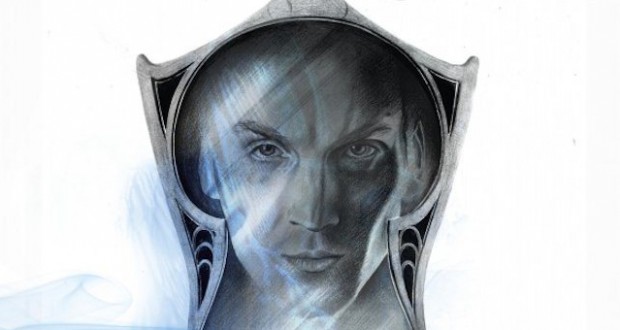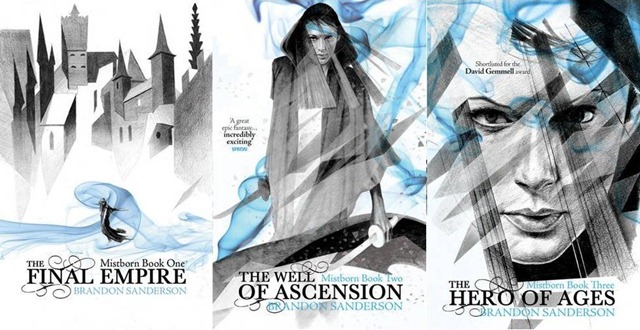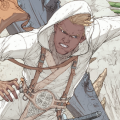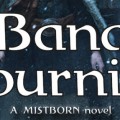Sanderson is currently the poster child for popular fantasy writing. And there’s a blood good reason for that – he’s great. It was the original Mistborn series that first made me fall for Sanderson’s storytelling and since then The Stormlight Archive has become possibly my favourite fantasy series ever. Mistborn was ostensibly a YA series, however, and often considered more accessibly than the rather heavy Stormlight Archive.
In the original trilogy, Sanderson manages something quite extraordinary – balancing the most epic of tales (revolution and the beginning of an entirely new world) with that of young love and teenagers figuring out who they are. For the sequel trilogy, Sanderson moves the story along several hundred of years after the new world was created. This is a frontier world filled with corrupt politicians, opportunistic criminals, and hardened lawmen who shoot first and ask questions later.
While Shadows of Self is undeniably fun and another solid entry in Sanderson’s oeuvre, it lacks the originality and epic stakes of the first trilogy. The Western setting is something I will always welcome, but Wax and Wayne, while both great characters (especially Wayne), can’t come close to Vin. Too often the plot involves concepts we’ve already learned the ins and outs of thoroughly, with hints at something new in the world coming in only by the end of Shadows of Self. This series feels like Sanderson’s playful attempt to bring Firefly and The Dresden Files together. The lighter tone makes for fun reading, but doesn’t manage to bring the same emotional impact the original trilogy had.
‘Politician slime is different from regular slime.’
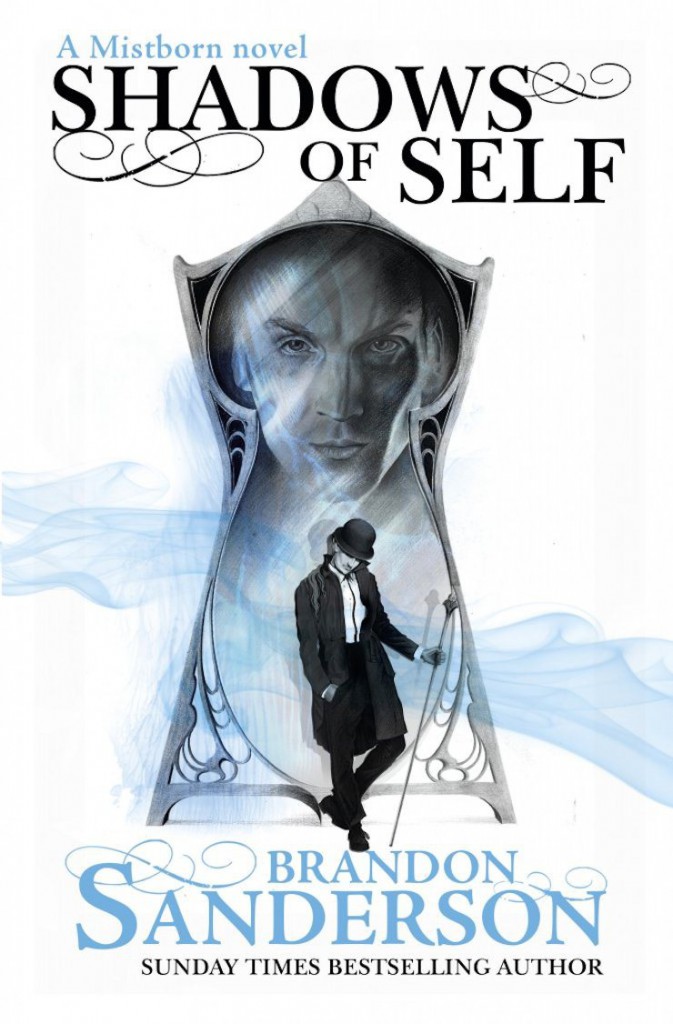 Shadows of Self, along with the first of the sequel trilogy, Alloy of Law, focus on Wax Ladrian and his rough around the edges colleague Wayne. Wax has been living in the Roughs for almost twenty years and has made a name for himself as a heroic lawman. He is finally lured back to the city of Elendel after the death of his wife. Wax inherits the title of Lord of the House Ladrian after his uncle is killed in an accident.
Shadows of Self, along with the first of the sequel trilogy, Alloy of Law, focus on Wax Ladrian and his rough around the edges colleague Wayne. Wax has been living in the Roughs for almost twenty years and has made a name for himself as a heroic lawman. He is finally lured back to the city of Elendel after the death of his wife. Wax inherits the title of Lord of the House Ladrian after his uncle is killed in an accident.
In Allow of Law, Wax attempts to navigate the politics and conventions of high society as he attempts to drag his House out of bankruptcy. Unable to let go of his lawman past, he manages to involve himself in a dangerous criminal element within the city. During the course of his investigation – and adventure – he is joined by his old colleague, and friend, Wayne and a young woman, Marasi, captivated by the tales of these two frontier men.
Two years later, in Shadows of Self, Wax still finds society tedious, but he does his best not to embarrass his fiancé Steris. No matter how successful he becomes at running his House, it seems the criminals of the city make a beeline for him. But this time, it is no ordinary criminal causing havoc in the city, but a Kandra. Kandra are ancient creatures, servants to God, who can impersonate anyone. One of their number has been driven insane, has learnt how to harness powers of Allomancy and Feruchemy, and is on the warpath – she seems to be riling up the people, readying for a revolution.
Can Wax stop the Kandra before the city is destroyed?
‘…if I could get everybody drunk, think how much happier this city would be.’
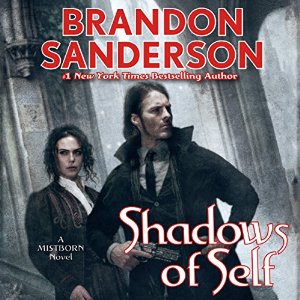 This is one of those series where the supporting cast is what really makes the story great. While Wax is a solid protagonist, the ultimate hero for a Western, burdened by his past and always fighting against the establishment, he isn’t nearly as fun or interesting as his friends. Wayne has so much personality, Sanderson has to reign him in. If it were a film, Wayne would be stealing every scene he featured in. He’s a klepto with an amazing ear for accents and an unparalleled ability at disguise. And if he weren’t brilliant enough on his own, the woman who holds his affections, Ranette, is just as brilliant. He knows things have become really bad when she doesn’t try to shoot him – now that’s love.
This is one of those series where the supporting cast is what really makes the story great. While Wax is a solid protagonist, the ultimate hero for a Western, burdened by his past and always fighting against the establishment, he isn’t nearly as fun or interesting as his friends. Wayne has so much personality, Sanderson has to reign him in. If it were a film, Wayne would be stealing every scene he featured in. He’s a klepto with an amazing ear for accents and an unparalleled ability at disguise. And if he weren’t brilliant enough on his own, the woman who holds his affections, Ranette, is just as brilliant. He knows things have become really bad when she doesn’t try to shoot him – now that’s love.
Meanwhile, keeping the estrogen levels strong (have to love Sanderson for his gender representation) are Marasi and Steris. Marasi is a very strong character with her own goals and moral code. She knows her own mind and loves to run after these men, looking for trouble. In Shadows of Self, Marasi has become a constable, therefore a legitimate (relatively… she’s meant to be a desk jockey, but she’s having none of that!) member of their party, giving her more opportunities to take charge of her own actions than she does in the first book.
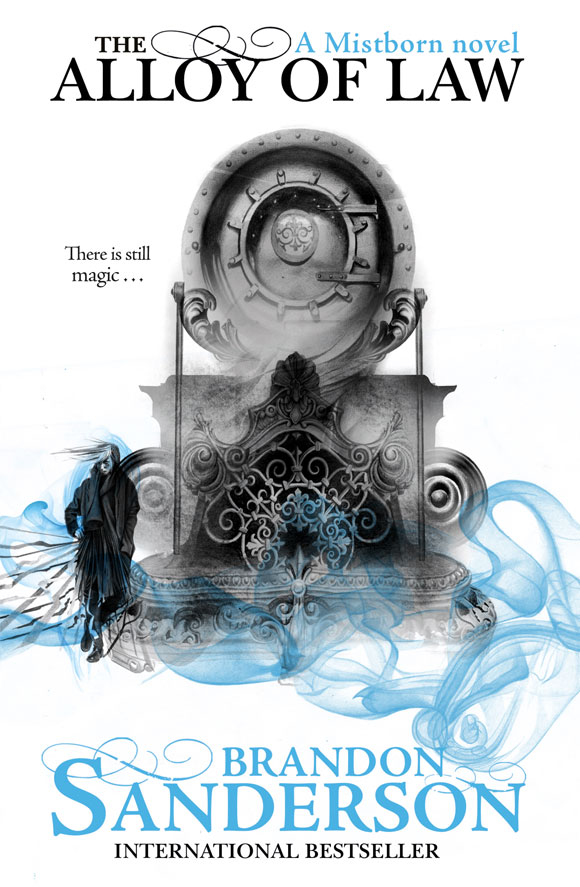 But it is Steris I really want to praise. For those of you who have read the books, you might wonder at this. I love Steris. It is so rare that we are given a female character like her, someone with possible OCD, known for being an interminable bore, is always ‘proper’ to the point of being austere, and all the while manages to be likeable. There are so many characters that overcome character flaws by being epic or badass in one way or another, but Steris does so in the subtlest ways, making her a truly unique character amongst the fantasy landscape.
But it is Steris I really want to praise. For those of you who have read the books, you might wonder at this. I love Steris. It is so rare that we are given a female character like her, someone with possible OCD, known for being an interminable bore, is always ‘proper’ to the point of being austere, and all the while manages to be likeable. There are so many characters that overcome character flaws by being epic or badass in one way or another, but Steris does so in the subtlest ways, making her a truly unique character amongst the fantasy landscape.
‘Don’t tell me you wouldn’t belch out of other body parts if you could.’
In all of Sanderson’s work, religion features heavily. The Mistborn novels have been particularly interesting in the way the characters are more than allowed to question their own beliefs – it is encouraged. Multiple religions exist and are seen as valid. The ‘God’ we see in Shadows of Self is none other than Sazed of the original trilogy – so is he really a god at all? What is a god? Just a powerful being?
 Despite this interesting approach to the nature of religion, the tone of this sequel trilogy does not work as well as the previous incarnation. The lighter tone of more tongue-in-cheek characters along with more mundane scale of the narratives works well together (and with the Western tropes), but it isn’t taken far enough. This lighter tone is what sets it apart from the previous series, and yet it then tries to go into more serious, world-impacting stories as the series wears on. It doesn’t quite work. The scale will never be as epic as the original, unless you undo or overwrite all the work Vin did. I feel Sanderson should have leaned into the humour more so, leaving the grand scale of the original Mistborn series in the past.
Despite this interesting approach to the nature of religion, the tone of this sequel trilogy does not work as well as the previous incarnation. The lighter tone of more tongue-in-cheek characters along with more mundane scale of the narratives works well together (and with the Western tropes), but it isn’t taken far enough. This lighter tone is what sets it apart from the previous series, and yet it then tries to go into more serious, world-impacting stories as the series wears on. It doesn’t quite work. The scale will never be as epic as the original, unless you undo or overwrite all the work Vin did. I feel Sanderson should have leaned into the humour more so, leaving the grand scale of the original Mistborn series in the past.
Verdict: As always, a great fun read from Sanderson. Shadows of Self is a much lighter than many of his other novels and very quick to read. Don’t expect the epic scale of the first Mistborn novels nor a great deal of extra world building. Instead, relish in spending a little more time in this awesome world.
Shadows of Self is due to publish on October 6th, from Tor Books.
Thanks to the publisher for the review copy.
 Pop Verse Pop Culture Universe
Pop Verse Pop Culture Universe
